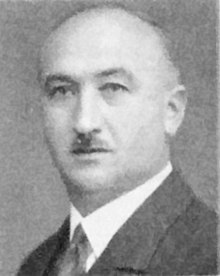Hans Dill
Johann 'Hans' Dill (born June 25, 1887 in Brand near Tachau , † July 7, 1973 in Neuenhain ) was a German politician ( SPD ).
Life and activity
Dill was the son of a farmer. After attending primary school, he learned the craft of a porcelain painter . He practiced this profession until 1912.
From 1912 Dill worked as a full-time party functionary of the SPD: He was first party secretary of his party in Nuremberg , then until 1919 district party secretary for Northern Bavaria, based in Nuremberg. During the First World War he also officiated as a social democratic municipal representative in Nuremberg.
After the collapse of the Wilhelmine Empire, Dill briefly held the post of state party secretary of the SPD for Bavaria from May to September 1919 . He then switched to the party press, for which he worked as an editor at the Munich Post from 1919 to 1927 . In 1927 he became party secretary of the SPD for the Franconian district.
From 1927 to 1933 Dill was again district party secretary of the SPD in Nuremberg. From 1927 he was second chairman of the SPD state committee for Bavaria.
From 1919 to 1932 Dill was a member of the Bavarian state parliament . At times he held the post of deputy parliamentary group leader within the SPD parliamentary group in the state parliament. In 1932 he resigned from this mandate.
On the occasion of the Reichstag election of September 1930, Dill was elected as a member of the Reichstag , in which he - re-elected in the elections of July 1932, November 1932 and March 1933 - represented constituency 26 (Franconia). The most important event in which Dill took part during his time as a member of parliament was the vote on the Enabling Act of March 1933, where he was one of the minority of 96 members who opposed this bill, which transferred legislative power from parliament to the Reich government led by Adolf Hitler, agreed.
A few months after the National Socialists came to power in the spring of 1933, Dill emigrated to Czechoslovakia . There he belonged to the SOPADE , the exile SPD. For these he worked from 1933 to 1936 as border secretary for Northern Bavaria. In this position he was responsible for organizing the smuggling of propaganda material into this area, for educating the local population about events that were concealed in the German media, which were in line with the policy, as well as for organizing the exchange of information between supporters of social democracy in the Reich and those in exile -SPD responsible.
After his emigration, the National Socialist police officers classified Dill as an enemy of the state. Criminal proceedings were initiated against him - as well as against his son Erhard, who worked as a courier for SOPADE - for preparation for high treason. Around 1937 the Nazi regime revoked Dill and his son's German citizenship and publicly announced the loss of their citizenship in the Reichsanzeiger . In the spring of 1940, the Reich Main Security Office in Berlin put him on the special wanted list GB , a list of people whom the Nazi surveillance apparatus regarded as particularly dangerous or important, which is why they should be removed from the occupation troops in the event of a successful invasion and occupation of the British Isles by the Wehrmacht Subsequent SS special commands were to be identified and arrested with special priority.
On the occasion of the annexation of the Sudeten areas by the German Reich in the course of the Nazi leadership's aggressive expansion policy in 1938, Dill went to Great Britain, later he settled in Canada. There Dill lived as a farmer in Tupper (Province of British Columbia ). He did not return to Germany until 1966.
literature
- Martin Schumacher (Hrsg.): MdR The Reichstag members of the Weimar Republic in the time of National Socialism. Political persecution, emigration and expatriation, 1933–1945. A biographical documentation . 3rd, considerably expanded and revised edition. Droste, Düsseldorf 1994, ISBN 3-7700-5183-1 .
Web links
- Hans Dill in the database of members of the Reichstag
- Hans Dill's biography . In: Wilhelm H. Schröder : Social Democratic Parliamentarians in the German Reich and Landtag 1876–1933 (BIOSOP)
- Hans Dill's biography . In: Heinrich Best and Wilhelm H. Schröder : Database of Members of the National Assembly and the German Reichstag 1919–1933 (Biorab – Weimar)
Individual evidence
- ↑ Michael Hepp / Hans Georg Lehmann: The expatriation of German citizens 1933-1945 according to the lists published in the Reichsanzeiger , 1985, p. 10.
- ^ Entry on Dill on the special wanted list GB (reproduced on the website of the Imperial War Museum in London) .
| personal data | |
|---|---|
| SURNAME | Dill, Hans |
| ALTERNATIVE NAMES | Dill, Johann |
| BRIEF DESCRIPTION | German politician (SPD), MdR |
| DATE OF BIRTH | June 25, 1887 |
| PLACE OF BIRTH | Fire near Tachau |
| DATE OF DEATH | 7th July 1973 |
| Place of death | Neuenhain |
